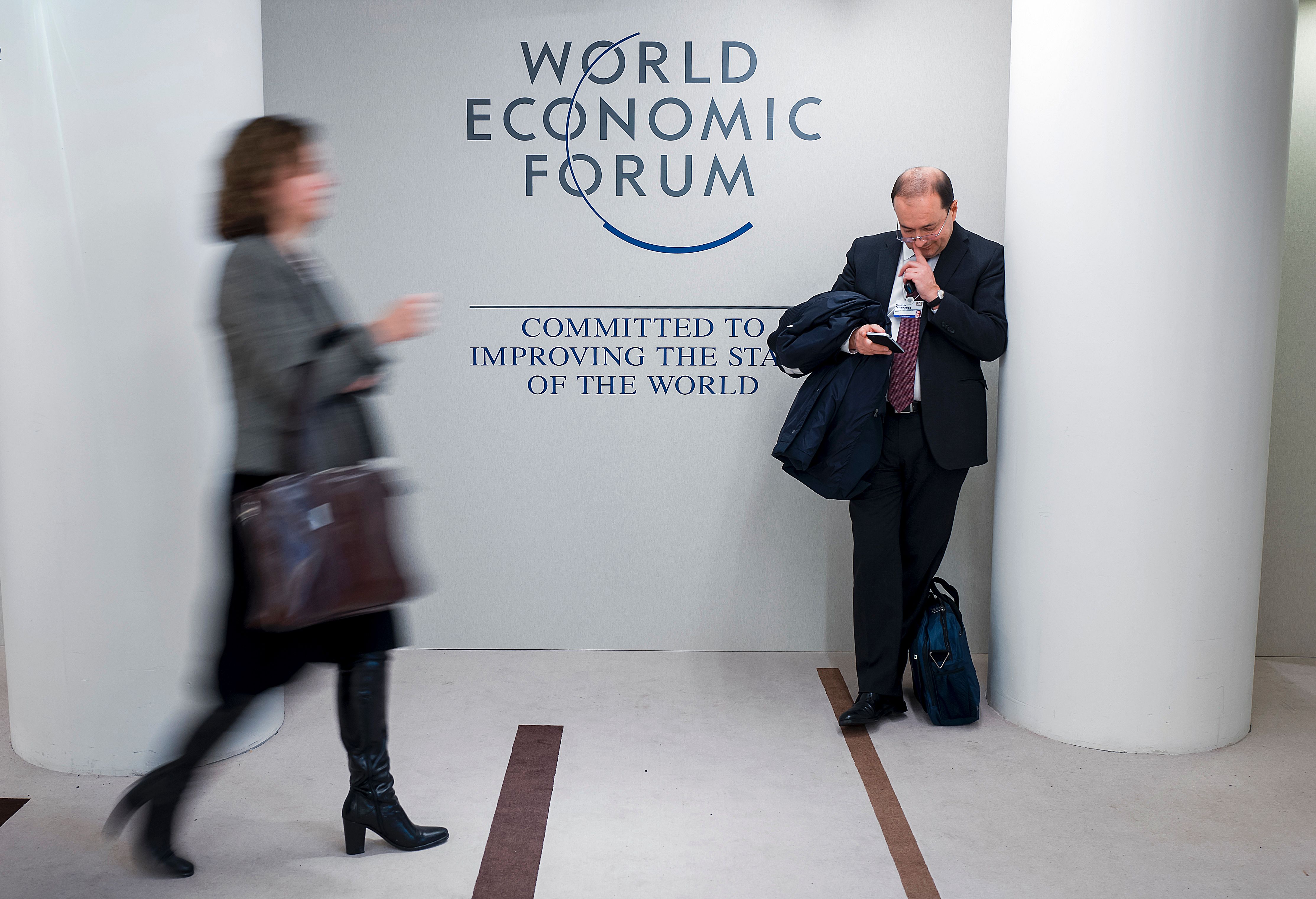Davos reminds us that smart people are dumb
Has there ever been a greater gift to comedy than the unintentionally hilarious dilettantes of Davos?


There has never been a greater gift to comedy than the World Economic Forum in Davos, Switzerland. Like sex robots, Davos is one of those subjects that is inherently funny. Even the most affectless description of its participants and their activities can inspire laughter. In fact, the more staid and neutral the prose, the more hilarious it sounds. Take this from a recent New York Times preview of this year's conference:
Davos has always been a playground for elites who believe in globalism, climate change, and free trade. The cast of multinational leaders this year ranges from chief executives like Jamie Dimon of JPMorgan Chase to philanthropists like Bill Gates and policymakers like Angela Merkel, Germany's chancellor. Over the years, it has attracted artists like Bono and Matt Damon.It is both speed-dating at high altitude for the cognoscenti and a cerebral affair filled with panel conversations about issues such as gender diversity, harassment, artificial intelligence, and the environment. The official theme this year is "Creating a shared future in a fractured world." [The New York Times]
Where should we begin? The acknowledgement in the first sentence that all of these people are school children who are really enjoying their recess? The equivocating use of "believe," which, depending on how you choose to make sense of it, either suggests that "free trade" is a dictate of natural science or affirms that "climate change" is a lot of windy nonsense that ultimately adds up to screwing over the world's poor, is genius. So too is the implicit suggestion that we no longer have statesmen and tycoons but a vague undifferentiated array of woke capitalists who belong neither to the public nor the private "sectors" but to their own rarified class of "multinational" ubermenschen. Doubtless Andrew Ross Sorkin was not attempting satire, but his material forced his hand. When he closed the first paragraph with "artists like Bono and Matt Damon," I could not choke back tears.
Davos is a work of art. And like all the best art, it both delights and instructs. It reminds us that the smartest people in the world are actually the dumbest.
The Week
Escape your echo chamber. Get the facts behind the news, plus analysis from multiple perspectives.

Sign up for The Week's Free Newsletters
From our morning news briefing to a weekly Good News Newsletter, get the best of The Week delivered directly to your inbox.
From our morning news briefing to a weekly Good News Newsletter, get the best of The Week delivered directly to your inbox.
Imagine being one of those exalted personages, graduates of our finest universities, global citizens equally at home in Manhattan, San Francisco, Paris, Tokyo, and Bombay, for whom "Creating a shared future in a fractured world" is a highly erudite proposition, a paradox of chin-scratching complexity. Imagine going every year for decades without realizing that this year's "theme" and "The Power of collaborative innovation" (2008) and "Global cooperation and megacompetition" (1990) and "Competitive cooperation in a decade of turbulence" (1988) are virtually identical. Imagine thinking that "Responsive and responsible leadership" (2017) is not a meaningless phrase. Imagine having any idea what "Resilient dynamism" (2013) even means. Imagine thinking that "globality," as in "Responsible globality: managing the impact of globalization" (1999), is a word.
At Davos each year the world's richest and most powerful people travel in private jets to an expensive resort in an expensive city in the world's most expensive country and pretend to ask one another whether those policies that have made them worthy of attending something called "the Crystal Awards" with Sir Elton John are right and just. It turns out they always are. For them it is a simple matter of taking a handful of meaningless abstract words — "impact," "norms," "leadership," "network," "growth," "context," "models," "agenda" — and combining them in vaguely pleasing patterns. Here are the spells that turn man-made ecological and humanitarian crises in Africa into "challenges," the talismans that absolve the owners of sweatshops in Bangladesh from being guilty of anything but "transformation."
Until recently there was some talk of a possible shake-up at this year's forum. The thinking, if one can call it that, was that a man who has spent decades of his life flying on high-end personal aircraft to exclusive meetings in rarified locales at which he arranged for poor people to build luxury accommodations for the ultra-rich and even poorer people to make hideous ties for the not-so-rich would somehow threaten the whole proceedings. Did they think he would disagree with them about the food? Thank goodness the Democrats caved inexplicably to Mitch McConnell on Monday. Otherwise President Trump might never have had the opportunity to put his fellow MBAs at ease about his intentions.
Like a thousand hours of hyperdistilled TED talks cut with Tyler Cowen blog posts, served over ice, and garnished with a twist of the post-Obergefell rainbow Goldman Sachs logo, Davos is the essence of neoliberalism. Its aims and methods are worthy of that greatest of liberal thinkers, Lewis Carroll's Humpty Dumpty, who told Alice all those years ago:
A free daily email with the biggest news stories of the day – and the best features from TheWeek.com
"When I use a word," Humpty Dumpty said, in rather a scornful tone, "it means just what I choose it to mean — neither more nor less.""The question is," said Alice, "whether you can make words mean so many different things.""The question is," said Humpty Dumpty, "which is to be master — that's all." [Through the Looking-Glass]
Humpty's question is the one thing that Davos attendees will never find themselves forced to ponder.
Matthew Walther is a national correspondent at The Week. His work has also appeared in First Things, The Spectator of London, The Catholic Herald, National Review, and other publications. He is currently writing a biography of the Rev. Montague Summers. He is also a Robert Novak Journalism Fellow.
-
 The best fanfic that got published and went mainstream
The best fanfic that got published and went mainstreamThe Week Recommends Fan fiction websites are a treasure trove of future darlings of publishing
-
 ‘Something close to a universal rallying cry’
‘Something close to a universal rallying cry’Instant Opinion Opinion, comment and editorials of the day
-
 Trump sues IRS for $10B over tax record leaks
Trump sues IRS for $10B over tax record leaksSpeed Read The president is claiming ‘reputational and financial harm’ from leaks of his tax information between 2018 and 2020
-
 Israel retrieves final hostage’s body from Gaza
Israel retrieves final hostage’s body from GazaSpeed Read The 24-year-old police officer was killed during the initial Hamas attack
-
 China’s Xi targets top general in growing purge
China’s Xi targets top general in growing purgeSpeed Read Zhang Youxia is being investigated over ‘grave violations’ of the law
-
 Panama and Canada are negotiating over a crucial copper mine
Panama and Canada are negotiating over a crucial copper mineIn the Spotlight Panama is set to make a final decision on the mine this summer
-
 Why Greenland’s natural resources are nearly impossible to mine
Why Greenland’s natural resources are nearly impossible to mineThe Explainer The country’s natural landscape makes the task extremely difficult
-
 Iran cuts internet as protests escalate
Iran cuts internet as protests escalateSpeed Reada Government buildings across the country have been set on fire
-
 US nabs ‘shadow’ tanker claimed by Russia
US nabs ‘shadow’ tanker claimed by RussiaSpeed Read The ship was one of two vessels seized by the US military
-
 How Bulgaria’s government fell amid mass protests
How Bulgaria’s government fell amid mass protestsThe Explainer The country’s prime minister resigned as part of the fallout
-
 Femicide: Italy’s newest crime
Femicide: Italy’s newest crimeThe Explainer Landmark law to criminalise murder of a woman as an ‘act of hatred’ or ‘subjugation’ but critics say Italy is still deeply patriarchal
